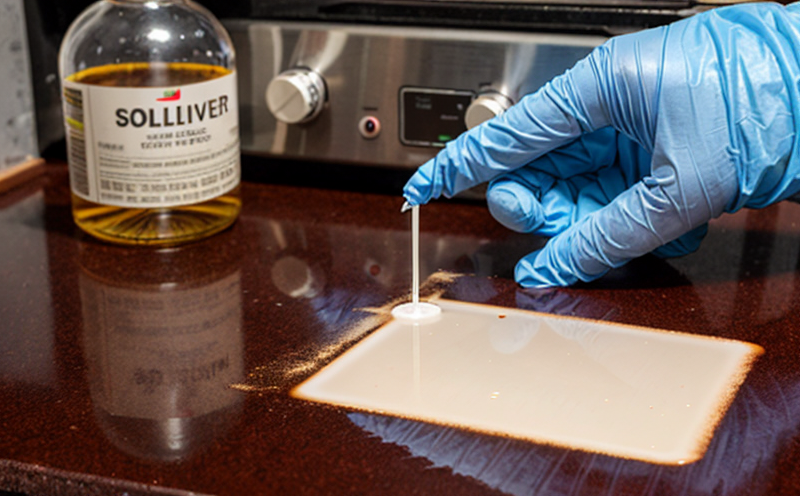Cooking Oil Solvent Residue Testing
In the food and beverage industry, the quality of cooking oils plays a crucial role in ensuring product safety and consumer satisfaction. One critical aspect of maintaining high standards is the measurement of solvent residues in cooking oils. Solvent residues can be introduced during oil extraction or refining processes, and their presence may affect the flavor, aroma, and overall quality of the final products.
The primary goal of Cooking Oil Solvent Residue Testing is to ensure that the residual solvents used in the manufacturing process do not exceed acceptable limits set by international standards. This service ensures compliance with regulatory requirements such as ISO 3658:2014, which provides methods for determining the residue of organic solvents in refined oils.
The testing process involves several steps to ensure accurate and reliable results. The first step is the sample preparation, where a representative portion of the oil sample is taken under controlled conditions. This sample is then subjected to thorough analysis using sophisticated laboratory instruments such as gas chromatography (GC) or high-performance liquid chromatography (HPLC).
The testing process also includes instrument calibration and method validation, ensuring that the results obtained are both accurate and reproducible. The use of advanced analytical techniques allows for precise measurement of even trace levels of solvents in cooking oils.
Once the analysis is complete, a detailed report is generated. This report includes not only the quantified results but also recommendations for process improvements if necessary. Compliance officers and quality managers can rely on this data to make informed decisions about their production processes.
Cooking oil solvent residue testing is essential in maintaining product integrity and ensuring that consumer safety is not compromised. By adhering to international standards, companies can demonstrate their commitment to quality and regulatory compliance.
Why It Matters
The importance of Cooking Oil Solvent Residue Testing cannot be overstated in the food and beverage industry. Compliance with regulatory requirements is not just a matter of avoiding fines or sanctions; it's about ensuring product safety, maintaining brand reputation, and protecting consumer health.
- Compliance with Regulations: Many countries have strict regulations regarding the allowable levels of solvent residues in cooking oils. For instance, the EU has specific directives that govern the use of solvents in food production processes. Failure to comply can lead to product recalls or withdrawal from the market.
- Consumer Safety: Excessive solvent residues can pose a risk to human health if ingested. It is crucial for manufacturers to ensure that their products meet strict safety standards, especially when it comes to items consumed daily by millions of people.
- Brand Reputation: A reputation for producing safe and high-quality products is vital in maintaining consumer trust. Companies that consistently adhere to international standards are more likely to retain loyal customers and attract new ones.
In summary, cooking oil solvent residue testing is a critical component of ensuring product safety and regulatory compliance. It helps manufacturers stay ahead of potential risks and enhances their reputation among consumers and regulatory bodies alike.
Customer Impact and Satisfaction
- Increased Product Safety: By conducting solvent residue tests, companies can ensure that their cooking oils are free from harmful solvents. This not only protects the health of consumers but also enhances overall product quality.
- Regulatory Compliance: Adherence to international standards such as ISO 3658:2014 ensures that products meet legal requirements, thereby reducing the risk of sanctions or penalties.
- Enhanced Brand Reputation: Consistent compliance with testing protocols can significantly improve a company's image and reputation in the market. This is especially important for brands committed to transparency and quality.
In addition to these tangible benefits, customer satisfaction is also a key outcome of thorough solvent residue testing. Consumers trust products that come from reputable manufacturers who prioritize safety and compliance. By providing clear evidence of testing results and adherence to standards, companies can build stronger relationships with their customers.
Use Cases and Application Examples
- Manufacturing Process Optimization: Regular solvent residue testing helps manufacturers identify potential issues in the production process. By detecting trace amounts of solvents early on, companies can make necessary adjustments to improve efficiency and reduce waste.
- Supply Chain Management: Testing at various stages of the supply chain ensures that all suppliers adhere to quality standards. This prevents substandard materials from entering the production cycle.
- New Product Development: During the development phase, testing solvent residues can help identify suitable solvents and refining processes without compromising product safety or quality.
For instance, a leading food manufacturer conducted a series of tests on its cooking oil samples. The results showed that one batch contained slightly higher levels of residual solvents than the others. Upon further investigation, it was discovered that this particular batch had undergone an additional refining step. By adjusting the process, the company was able to bring all batches back into compliance with international standards.





